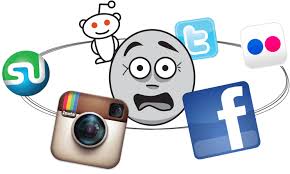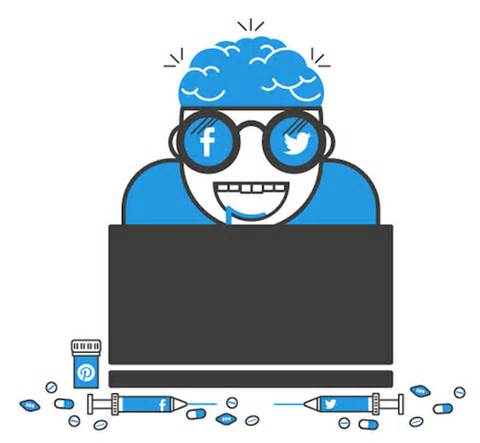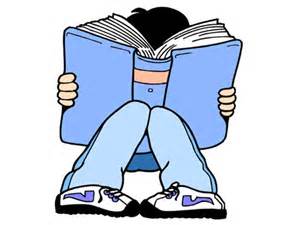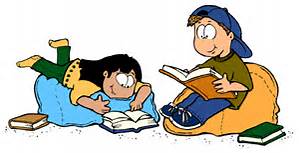IF YOU LOVE BOOKS, DON’T READ THIS
4-04-2016 – IF YOU LOVE BOOKS, DON’T READ THIS
As a writer who spends endless hours alone glued to a computer, I’m well aware of the lure of Facebook, Twitter, and other digital distractions. And yet the more diatribes I read about social media addiction destroying civility and civilization, the more I am reminded of many age-old critiques of book-reading. So, at risk of incurring the wrath of book lovers everywhere, I have to ask: are books and social media all that different in their potential to distract us from our friends, family, and even ourselves?
Books are not social media.  I get that. I understand that the siren call of my email and Facebook feed is more akin to the call (on steroids) of the mailbox, answering machine, or doorbell than to the call of reading a book. I also understand that clicking on an eyecatching link does not necessarily, or perhaps ever, produce an experience equivalent to the experience of reading a book. Books require thoughtful, prolonged engagement with text, for one thing, not 140 character tweets or endless link-jumping every time interest flags.
I get that. I understand that the siren call of my email and Facebook feed is more akin to the call (on steroids) of the mailbox, answering machine, or doorbell than to the call of reading a book. I also understand that clicking on an eyecatching link does not necessarily, or perhaps ever, produce an experience equivalent to the experience of reading a book. Books require thoughtful, prolonged engagement with text, for one thing, not 140 character tweets or endless link-jumping every time interest flags.
On the latter note, it’s worth considering whether sustained engagement with text is the only or best way to learn or communicate (I can argue both sides here)—or even whether this kind of “reading Eden” ever actually existed. Katy Waldman questions the latter in a 2014 Slate article, Reading Insecurity, which she defines as the subjective experience of thinking you’re not getting as much from reading as you used to get. Maybe we never got as much as we now think we did.
But I digress. Regardless of whether social media is sapping our ability to sustain attention, neither books nor social media are guilt-free when it comes to luring us away from life. Both are tantalizing forms of technology that draw our attention away from what is around us and focus it instead on a new world—one that in the book is by no means inherently more wholesome or erudite than the one online.
Whether in the form of a book or a digital post, technology is tempting and addictive because it allows us, particularly those of us who spend a lot of time alone, to fill a basic and very human social need. It removes us from our isolation and connects us into social discourse. True, that social discourse is with a virtual community, and by joining it we temporarily take leave of the real community in our midst, if we happen to have one. But that is just as true of absorption in a book as it is absorption in your phone or your iPad.
The Dangerous Habit of Reading
I’m not the only one who has wondered if digital technology is a unique threat. In a recent American Scholar piece advocating for the humanization of digital life, historian James McWilliams reminds us that hand-wringing over technology’s impact on humanity is an age-old problem, even when the new technology was the written word. He notes that Socrates himself “fretted that the written word would compromise our ability to retell stories. Such a radical shift in communication…would favor cheap symbols over actual memories, ease of conveyance over inner depth.” In Plato’s dialogue Phaedrus, Socrates thus has the Egyptian god Thamus warn that the written word destroys memory both of ourselves and of the real world.
Over the centuries many people continued to condemn the dangerous habit of reading, and not just because it strains the eyes, ruins the posture or, as Renaissan ce physicians worried, unbalances the bodily humours. Too much reading was long believed to be the source of mental and physical decline, a recipe for losing touch with reality and with what mattered most in life: your family, your friends, your duties, and even yourself.
ce physicians worried, unbalances the bodily humours. Too much reading was long believed to be the source of mental and physical decline, a recipe for losing touch with reality and with what mattered most in life: your family, your friends, your duties, and even yourself.
Surely the most memorable example of the dangers of reading is Don Quixote, whose “brain dried up on him” from “reading too much and sleeping too little.” Poor Don Quixote spent so much time reading books of knight errantry that he overlooked the care of his estate and loved ones.
According to British historian of medicine Roy Porter in Reading is Bad for Your Health. Don Quixote was by no means the only reader who belonged in a madhouse, which a few centuries ago turned out to be a place where you could live amongst piles of books and read to your heart’s content. In 1809 Scottish physician and poet John Ferriar even defined a brand new symptom of obsessive compulsive disorder, “Bibliomania,” characterized by collecting or hoarding books to the point of damaging social relations:
What wild desires, what restless torments seize
The hapless man, who feels the book-disease
No wonder then, that in The Country of the Pointed Firs, Sarah Orne Jewett wrote: “Captain Littlepage had overset his mind with too much reading.” And perhaps young Alice may have been on to something when she wondered “…and what is the use of a book without pictures or conversations?” She may have been longing for social media before her time.
Novels as Sou l Sappers
l Sappers
Particularly suspect were novels. Throughout the 19th century novels were seen as silly at best and as soul-sapping traps at worst. Novel readers, especially female novel readers, were criticized for dreaming their days away, losing track of reality and even their sense of themselves and their limitations. According to Porter,
Novel reading among fashionable young ladies was said to lead to hysteria or the vapours. ‘If women who spent their energies on their brains married,’ warned the [Victorian psychiatrist] Thomas Clouston, ‘they seldom had more than one or two children,’ and ‘only puny creatures at that, whom they cannot nurse, and who either die in youth or grow up to be feeble-minded folks.’ ‘Beware, oh beware!,’ mocked [19th century feminist and social reformer] Frances Power Cobbe. ‘Science pronounces that the woman who—studies—is lost!’
In her essay, Dark Books, Tara Isabella Burton, explains that novels were seen as dangerous “not simply because of the stories they might contain—the romantic expressions of wish-fulfillment, for example, that led Emma Bovary down the garden path of adultery—but also because reading itself was seen as a kind of possession: an encroachment of the ‘other’ upon the self.”
Anna North’s article, When Novels Were Bad for You, notes that just like late 18th and early 19th century fears about novel reading, today’s fears about Internet reading reflect a “distrust of the individual being able to differentiate good from bad material, or using the information that they absorb productively, constructively and safely.” Romances, of course, were the worst of books, exposing readers to make-believe worlds and wonders that would fill them with unachievable and incapacitating expectations.
The problem with romances and other novels was that they blurred the distinction between reality and make-believe, and that they were so absorbing that readers lost touch with real life. Now, of course, we value novels and other fiction for the very same reason.
Social Media Addiction and Humanity
So, does the current outcry about social media addiction reflect a genuinely new threat? Or does it simply reflect an age-old distrust of a new technology doing nothing more than fulfilling the very human need for social contact?
Certainly looking at historical critiques of reading suggests that we book lovers should consider the latter possibility before throwing too many stones. People still whisper about their secret obsession with books, after all, and few can deny the addictive power and inherent danger of the book. Many of us have memories of sneaking books under bedcovers and reading by flashlight so our parents wouldn’t know we were breaking rules. And, of course, some books are banned, even burned, and so they must indeed be dangerous. All of this suggests that perhaps books are getting off too easily these days, or, conversely, that we’re being too harsh about the dire effects of social media.
It’s worth considering anyway. Meanwhile, if you’re mad about all this, take a look at the Dangers of Reading Books from the tongue-in-cheek website Your Guide to Life. These dangers include gems like “You cannot see a bear sneaking up on you if you are reading a book” and “Reading can isolate you from social activities, thus dooming you to a lonely, meaningless existence.” Laugh all you will. But maybe, just maybe, consider as you’re laughing how many of these “warnings” might also pertain to social media.
Cheers!
Terra Ziporyn
TERRA ZIPORYN is an award-winning novelist, playwright, and science writer whose numerous popular health and medical publications include The New Harvard Guide to Women’s Health, Nameless Diseases, and Alternative Medicine for Dummies. Her novels include Do Not Go Gentle, The Bliss of Solitude, and Time’s Fool, which in 2008 was awarded first prize for historical fiction by the Maryland Writers Association. Terra has participated in both the Bread Loaf Writers Conference and the Old Chatham Writers Conference and for many years was a member of Theatre Building Chicago’s Writers Workshop (New Tuners). A former associate editor of the Journal of the American Medical Association (JAMA), she has a PhD in the history of science and medicine from the University of Chicago and a BA in both history and biology from Yale University, where she also studied playwriting with Ted Tally. Her latest novel, Permanent Makeup, is available in paperback and as a Kindle Select Book.
- Web |
- More Posts(106)